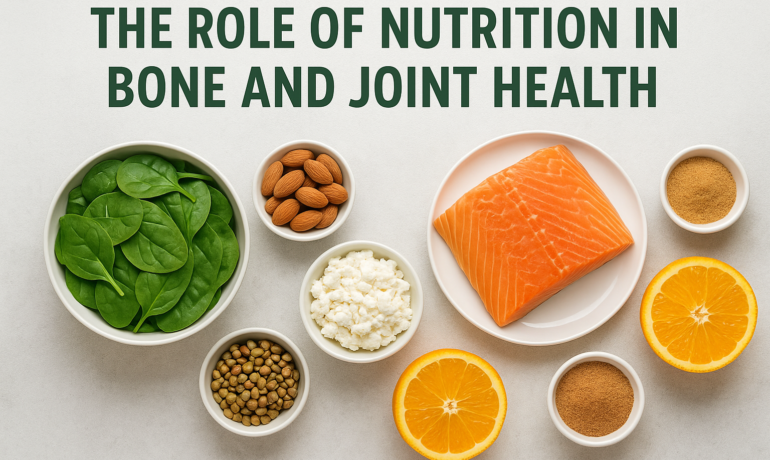Bones and joints are the framework that supports our body, allowing movement and strength. Proper nutrition plays a vital role in maintaining their health. A balanced diet rich in essential vitamins and minerals ensures the growth, repair, and resilience of the skeletal system. Without adequate nutrients, bones can become brittle, and joints may lose flexibility, increasing the risk of injuries and degenerative diseases like osteoporosis and arthritis.
1. Why Nutrition Matters for Bone and Joint Health
Nutrition is the foundation for maintaining bone density and joint flexibility. The body constantly renews bone tissue, and this process requires specific nutrients. Similarly, cartilage and connective tissues within joints depend on essential compounds to remain lubricated and strong. A deficiency in these nutrients can lead to pain, stiffness, and reduced mobility over time.
2. Essential Nutrients for Strong Bones
Calcium: This mineral is the primary building block of bones. It provides structural strength and stability. Dairy products, leafy greens, and fortified foods are excellent sources.
Vitamin D: It aids calcium absorption and regulates bone mineralization. Regular sunlight exposure and foods like fish, egg yolks, and fortified milk help maintain adequate levels.
Magnesium: It supports bone formation and works with calcium to maintain bone density. Found in nuts, seeds, and whole grains, magnesium contributes to skeletal health.
Phosphorus: This mineral pairs with calcium to form the mineral matrix of bones. Foods like meat, fish, and dairy supply sufficient phosphorus.
Vitamin K: It helps bind calcium to the bone matrix, reducing the risk of fractures. Green vegetables such as kale and spinach are rich sources.
3. Key Nutrients for Healthy Joints
Omega-3 Fatty Acids: Found in fish and flaxseeds, these healthy fats reduce inflammation in the joints, improving mobility and comfort.
Collagen: A structural protein that supports cartilage strength and elasticity. Bone broth and supplements help boost collagen levels.
Vitamin C: Essential for collagen synthesis, it also acts as an antioxidant, protecting joints from free radical damage. Citrus fruits and berries are rich sources.
Zinc: This mineral supports tissue repair and helps reduce joint inflammation. Nuts, beans, and seafood are good dietary options.
4. Impact of Poor Nutrition on Bone and Joint Health
A diet lacking essential nutrients can weaken the skeletal system. Calcium and vitamin D deficiency may cause osteoporosis, while inadequate protein intake can slow bone healing. Similarly, processed foods high in sugar and sodium can lead to inflammation and joint stiffness. Maintaining balanced nutrition can prevent premature bone loss and reduce chronic pain.
5. Lifestyle Tips to Support Bone and Joint Health
• Include a variety of nutrient-dense foods in your daily diet.
• Engage in regular weight-bearing exercises like walking or yoga.
• Avoid smoking and limit alcohol consumption.
• Maintain a healthy body weight to reduce stress on joints.
• Stay hydrated to keep cartilage supple and flexible.
6. Role of Hydration and Protein in Skeletal Strength
Water is crucial for joint lubrication, preventing friction during movement. Protein supports muscle mass that protects bones and joints. Incorporating lean meats, legumes, and dairy products ensures the body gets enough amino acids for tissue repair and growth.
7. Preventive Nutrition for Aging Bones
As we age, bone density naturally decreases. Nutritional strategies such as increased calcium and vitamin D intake, along with regular exercise, help slow this process. Consuming anti-inflammatory foods like fatty fish, nuts, and fresh vegetables can also protect against joint deterioration.
Conclusion
Proper nutrition is the key to strong bones and flexible joints. Consuming balanced meals rich in essential vitamins and minerals keeps your body active and reduces the risk of bone-related disorders.

